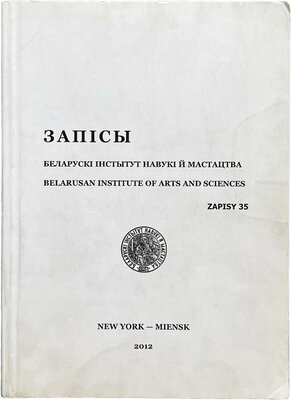 КНІГІ ОНЛАЙН
КНІГІ ОНЛАЙН
Пошук сярод кніг, што прайшлі індэксацыю гуглам. Некаторыя кнігі гугл не знаходзіць
[Oh, it seems I can pinch it under its wing (I am running straight across the meadow). Above me the wings are a white roof, And before me is a black tail...] Exhausted, I later weep for a long time. Everyone tries to comfort me: The stork wears red boots And will bring you similar ones... Grief and work bend my shoulders. Fate has sent me a good measure of everything... Now already I am growing grey at the temples. And yet I am even now trying to catch a stork. & The combination of simplicity with the subtle art that conceals art in this poem is entirely characteristic of Baradulin’s work throughout his life. Fifteen years later he dedicated another poem to Bykau, linking philosophy with the natural world, „Мы на агонь глядзім..." QWe Gaze at the Fire...“, 1977). Again simplicity of form, musicality and a broad idea are of the essence: Мы на агонь глядзім Пры вогнішчы рудым. Як схімнік-нелюдзім, Зьнікае ў неба дым. Гарыць агонь-багач I цемру й ціш ірве. Цень жудасьці, Пабач, — Ступае на траве. Няйнакш I прашчур наш, Укленчыўты агню, Узьняў свой позірк Аж Дазор Упершыню. Зглыдаў агонь датла Гальля рудую медзь. I нам пасля сьвятла Страйіней у змрок глядзець.'2 Well, this time I come back with a bird I certainly went many miles to get him! Above me the wings are like a white roof; Just try to catch a stork by the tail. (Барадулін, Рыгор. Выбраныя творы ў двух тамах. Мінск: Мастацкая літаратура, 1984. Т. 1. С. іоо—іоі). 12 We gaze at the fire With its red-brown flame. Like a hermit monk, The smoke disappears into the sky. In the poem whose title is taken as the epigraph of this piece, „За словам Быкава іду!“ („I Follow Bykau’s Words!", 1989), we are reminded strongly that the two writers, as indeed, several others, good, bad and indifferent13, come from the same part of Belarus, as in the opening lines: Чытаю Быкава I зноў Бяртаюся ў краіну сноў, У старану маю лясную, Якую, Покуль я існую, Люблю ў затуле туманоў, Ей плачу, бачу, ёй блазную. Завецца ўшацкай старана f-.J14 => The rich fire burns And tears apart the darkness and the silence. A shadow of horror, Look, — Is moving across the grass. No differently Our ancestor likewise, Kneeling before the fire Raised his gaze For the first time Right To the stars. The fire completely gobbled up The red-brown copper of the branches. And for us, after the light, It is more fearsome to gaze into the darkness. (Барадулін, Рыгор. Трэба дома бываць часцей... С. 132—133.) 13 Amongst them is the same Piatrus Brouka, who wrote so enthusiastically about Stalin as his „very best friend" in „Думы аб правадыру" in : Ад шчырага Capua: Зборнік вершаў беларускіх пісьменнікаў, прысвечаных т. Сталіну... с. 135-138. 14I read Bykau And again Return to my native region & He describes himself as being led by Bykau’s „economical line" („Ашчадны быкаўскі радок“), showing how it evokes in him by the simplest of means, a strongly emotional memory of his native parts. A word with the same root as ашчадны (нашча — on an empty stomach) plays a prominent part in the opening of Baradulin’s triptych of articles about Bykau. Here are the first three lines: Нашча трэба чытаць Васіля Быкава. Нашча трэба думаць пра Васіля Быкава. Нашча трэба хінуцца душой да сьвятла слова ягонага'5. Not for nothing did Bykau refer to Baradulin as „the nightingale ofBelarus“'t>, and in examining the relationship of these two writers it is essential to stress that artistically they are completely different: Bykau’s severe, even harsh, realism, relating past to present is far from the virtuosic, highly metaphorical, ludic nature of much of Baradulin’s poetry. This is not to say, however, as has already been noted, that they do not thoroughly appreciate the essence of each other’s work. Where they are truly close is in their patrio- To my forest parts, which, For as long as I live, I love it shrouded in mist, I weep to it, I see it, I play the fool before it. It is called the Vusaca region [...]. (Барадулін, Рыгор. Трэба дома бываць часцей... С. 298.) 15 You must read Vasil Bykaii on an empty stomach. You must think about Vasil Bykau on an empty stomach. You must bring your soul to the light of his word on an empty stomach. (Барадулін, Рыгор. Аратай, які пасьвіць аблокі: Сяброўскае слова, эсэ і некананізаваныя ўспаміны. Мінск: Мастацкая літаратура, 1995. С. 61). 16 Гл.: Законнікаў, Сяргей. Пакуль баліць душа // Полымя. 1995. №1. С. 219. In the Belarusian context it is hard for the present writer to think of any nightingale without the hero ofZmitrok Biadula’s multi-faceted historical novel „Салавей“ („The nightingale”, 1927) who declares with a resolution worthy of Vasil Bykau himself, „Нядобра быць панскім салаўём!" do not wish to be a nobleman’s nightingale!”): Бядуля, Змітрок. Збор твораў у чатырох тамах. Т. зМінск: Дзяржаўнае выдавецтва БССР, 1953С. 108. Indeed, the peasant nightingale’s subsequent fate as a bandit in the forests an in no way be compared to Baradulin’s as a people’s poet. In all probability, therefore, Bykau’s idea of a nightingale was similar to that of John Keats and many other poets. tism, their concern for the future of Belarus and its language, their intolerance of immorality17, and, above all, their role as inspirational leaders of all nationally conscious Belarusians. In his essay of 1993 entitled „Апостпал нацыі" („The Nation’s Apostle") Baradulin links Bykau with such great figures of the past as Skaryna, Kalinouski and Kupala, suggesting, rightly, that it is Bykau who made Belarusian literature known in the world. Acclaiming him as „the shining apostle of the nation", he, also rightly, observes that, though apostles are few, they cannot be stopped and that „the nation will live so long as its apostles live“'s. In another essay of the same year, „Космас Васіля Быкава" („The Cosmos of Vasil Bykau"), Baradulin describes Bykau as personifying the conscience and intellect of Belarus, as bearing his fatherland within himself19. The third essay of this triptych, written a year later, is entitled „Як васілёк y жыце Беларушчыны" („Like a Cornflower in the Com of the Belarusian World"). Even better known than the stork as a national symbol is the cornflower, and Baradulin seems to relish the phonemic connection of the work „vasilok" with that of his friend Vasil. In a poem from the „Вечальле" collection of 1980, „Васільковая баляда" („Ballad of a Cornflower"), he clearly links Vasil and vasilok (there is also a Vasilicha). Two lines will suffice to establish this association: Капацьакопы Пайшоў Васілёк2". 17 Baradulin’s attitude may be summed up in a spectacular portmanteau word, kulasoramunieprabivajemyja (proof against the bullets of conscience) he created in a poem of the early 1990s, „А жалезныя хлопчыкі...“ („But Iron Youths..."): Барадулін, Рыгор. Міласэрнасьцьплахі. Мінск: Мастацкая літаратура, 1992. С. 161. The fact that venal communist critics so frequently attacked Bykau for his „moralizing" speaks for itself. See, for instance, an article entitled „Пена на волне перестройкй" in „Вечернйй Мйнск“, 27 October 1988, Р. 3, where an anonymous writer complains, „in every statement they make one constantly finds hints about „morality", „ethics" and „duty"". Another journal particularly active in the anti-liberal backlash was „Полйтйческйй собеседнйк". See, for instance: Бумажкова, T. Барьер полнтнческой слепоты // Полнтнческнй собеседннк. 1989. №1. С. 34. 18 Барадулін, Рыгор. Аратай, які пасвіць аблокі... С. 62—65. ” Барадулін, Рыгор. Аратай, які пасвіць аблокі... С. 65—66. 20 Little Vasil [cornflower] went To dig trenches. (Барадулін, Рыгор. Вечальле. Мінск: Мастацкая літаратура, 1980. С. 168). It is, perhaps, not surprising that the severe prose writer Vasil Bykau is less effusive about his friend than vice versa. Apart from the intrinsic differences between prose and poetry, Bykau’s mission to speak the truth about the past and present of his unfortunate country is made the more powerful by his use of understatement and reserve. Baradulin’s form of patriotism and concern for the future is more emotional and, at times, openly bitter. Nonetheless, Bykau from early years encouraged his younger colleague, and in introducing a milestone collection of his works, „Трэба дома бываць часьцей“, referred with total conviction to Baradulin’s unswerving conscience, and to the universal, even encyclopedic nature of his verse. The most touching and, in literary terms, finest expressions of Baradulin’s attitude towards Bykau are in the already mentioned outstanding little book „Лісты ў Хельсінкі" where Bykau’s quasi-naive sketches of Finnish life complement brilliantly some of Baradulin’s most heartfelt verses21. In them the poet both laments his friend’s absence and begs him to return home, although he probably knows better than anyone the impossibility of the latter course22. As anyone who has written about Baradulin knows, there is always a temptation to quote and quote, nowhere more so than in this brilliant collection. The book is divided into letters from Vusaca23, letters from Miensk, with Bykau’s sketches forming the third and last part. For simplicitiy of reference, the first letter from Vusaca, for instance, will be referred to as Vi, and the third letter from Miensk as M3, and so on. These verse epistles are, unsurprisingly, far from cheerful, as the last two lines of Vt (3 July 1998) demonstrate: Яшчэ імгненьне — I душа завые...24 21 It should not be forgotten that Bykau studied at the Viciebsk School of Art, made famous earlier by such outstanding figures as Mark Shagal (Chagall) and Kazimir Malevic, although he had to leave prematurely for economic reasons. 22 Bykau’s recent book of memoirs is entitled „Доўгая дарога дадому" („The Road Home Is a Long One", Minsk, 2002). 23 This how Ryhor Baradulin refers to his native region, although the Russified Belarusian encyclopedia, for instance, give the name of the central place as Usacy, and the river as Usaca: Беларуская савецкая энцыкляпэдыя. T. to. Мінск, 1974. С. 521.


